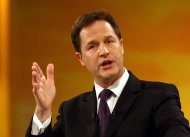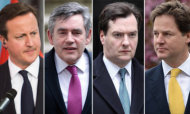The Archbishop of Canterbury has attacked David Cameron's "big society", saying it comes across as "aspirational waffle".
Rowan Williams says the prime minister's flagship policy - which had stated aim of empowering local people and communities - conceals "a deeply damaging withdrawal of the state from its responsibilities to the most vulnerable".
The criticism is made in a new book, extracts of which have been quoted in The Observer newspaper, and comes as Mr Cameron revealed he is considering axing most of the £1.8bn in housing benefit paid to the under-25s.
Mr Williams, who steps down in December after 10 years in his role as archbishop, writes: "The big society, introduced in the run-up to the last election as a major political idea for the coming generation, has suffered from a lack of definition about the means by which such ideals can be realised.
"Big society rhetoric is all too often heard by many therefore as aspirational waffle designed to conceal a deeply damaging withdrawal of the state from its responsibilities to the most vulnerable."
He suggests that ministers have fuelled cynicism over the Cameron vision by failing to define what the role of citizens should be.
"And if the big society is anything better than a slogan looking increasingly threadbare as we look at our society reeling under the impact of public spending cuts, then discussion on this subject has got to take on board some of those issues about what it is to be a citizen and where it is that we most deeply and helpfully acquire the resources of civic identity and dignity."
No 10 said: "The launch of Big Society Capital in April is a concrete example of the government delivering on its plans - £600m to help create a funding model that is truly self-sustaining and that will help charities and social enterprises to play their part in building a bigger society."
Meanwhile, hundreds of thousands of young people could be stripped of housing benefit and forced to live with their parents as part of a new welfare crackdown signalled
by Mr Cameron.
by Mr Cameron.
The PM insisted the system was giving the wrong incentives as he urged more action to prevent feckless families relying on state handouts.
The comments, in an interview with the Mail on Sunday, come ahead of a keynote speech on welfare Mr Cameron is due to deliver next week.
The measures said to be under consideration include scrapping most of the £1.8bn in housing benefits paid to 380,000 under 25s, worth an average £90 a week, forcing them to support themselves or live with their parents instead.
Also, stopping the £70-a-week dole payment for individuals who do not try hard enough to get work, and forcing a hard core of unemployed to do community work after two years - or lose all their benefits.



